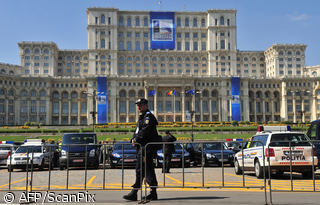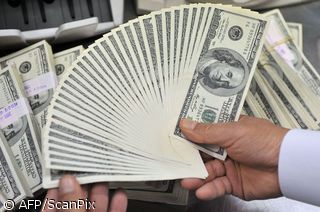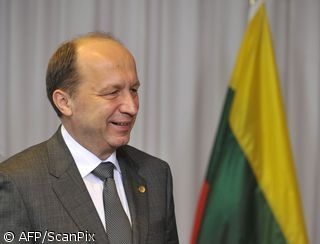Sweden Thrives on Exports One Year After Voters Reject the Euro
Published:
16 September 2004 y., Thursday
A year after Swedish Prime Minister Goeran Persson told voters his country needed the euro to compete in world markets, the Swedish economy has done a good job of proving him wrong.
The National Institute of Economic Research in Stockholm last month raised its economic growth forecast to 3.5 percent this year and 3 percent in 2005. A global expansion has boosted demand for Swedish exports while worker productivity has increased faster than in the 12 countries sharing the euro, which 56 percent of Swedish voters rejected on Sept. 14, 2003.
Swedish and international companies are betting on Sweden. Last month, for example, Atlet AB said it would close its forklift plant in Oberhausen, Germany, and move about 30 jobs to its factory in Moelnlycke, Sweden. Second-quarter foreign direct investment in Sweden jumped to a net 19.9 billion kronor ($2.7 billion), after a year-earlier outflow of 31.4 billion kronor.
The European Central Bank expects the economy of the euro region to expand about 1.9 percent this year and 2.3 percent in 2005. By one study, Sweden ranks second in the world in productivity.
Sweden, a nation of 9 million people that joined the European Union in 1994, accounts for 2 percent of the bloc's population and 2.7 percent of economic production. Its economy has grown faster than that of the euro region for eight of the past 10 years.
Šaltinis:
Bloomberg
Copying, publishing, announcing any information from the News.lt portal without written permission of News.lt editorial office is prohibited.
The most popular articles
 The EBRD is supporting the modernisation of transport infrastructure in Serbia with a €150 million sovereign loan to finalise the construction of a new motorway section along the strategic Corridor X.
more »
The EBRD is supporting the modernisation of transport infrastructure in Serbia with a €150 million sovereign loan to finalise the construction of a new motorway section along the strategic Corridor X.
more »
 The Executive Board of the International Monetary Fund (IMF) today completed the first review of Romania’s economic performance under a program supported by a 24-month Stand-By Arrangement (SBA).
more »
The Executive Board of the International Monetary Fund (IMF) today completed the first review of Romania’s economic performance under a program supported by a 24-month Stand-By Arrangement (SBA).
more »
 The Executive Board of the International Monetary Fund (IMF) today approved a three-year, SDR 13.57 million (about US$21.5 million) arrangement under the Poverty Reduction and Growth Facility (PRGF) for the Union of the Comoros.
more »
The Executive Board of the International Monetary Fund (IMF) today approved a three-year, SDR 13.57 million (about US$21.5 million) arrangement under the Poverty Reduction and Growth Facility (PRGF) for the Union of the Comoros.
more »
 The Executive Board of the International Monetary Fund (IMF) today completed the second review of Mongolia's economic performance under a program supported by an 18-month Stand-By Arrangement (SBA).
more »
The Executive Board of the International Monetary Fund (IMF) today completed the second review of Mongolia's economic performance under a program supported by an 18-month Stand-By Arrangement (SBA).
more »
 Parex banka has established a subsidiary, SIA NIF (“Nekustamo īpašumu fonds”, or “Real Estate Fund”), which will professionally manage assets that are not related to the Bank’s core business.
more »
Parex banka has established a subsidiary, SIA NIF (“Nekustamo īpašumu fonds”, or “Real Estate Fund”), which will professionally manage assets that are not related to the Bank’s core business.
more »
 In his address at the Lithuanian-Belarusian Business Forum “Belarus and Baltic States: new prospects for cooperation”, Prime Minister Andrius Kubilius has pointed out that Lithuania sees Belarus as creating its future in Europe...
more »
In his address at the Lithuanian-Belarusian Business Forum “Belarus and Baltic States: new prospects for cooperation”, Prime Minister Andrius Kubilius has pointed out that Lithuania sees Belarus as creating its future in Europe...
more »
 JDRF Employs VoIP and Web-Based Video Collaboration Enabled by Cisco for More Effective Teamwork Among Employees and Constituents.
more »
JDRF Employs VoIP and Web-Based Video Collaboration Enabled by Cisco for More Effective Teamwork Among Employees and Constituents.
more »
 On 16 September 2009, AB Bank SNORAS group finished the transaction during which it purchased from AB “Invalda” with its own funds 100 per cent of the shares of AB “Finasta įmonių finansai”, managing AB Bank “Finasta”.
more »
On 16 September 2009, AB Bank SNORAS group finished the transaction during which it purchased from AB “Invalda” with its own funds 100 per cent of the shares of AB “Finasta įmonių finansai”, managing AB Bank “Finasta”.
more »
 Federal Reserve Chairman Ben Bernanke that the worst U.S. recession since the Great Depression was probably over, but the recovery will take time.
more »
Federal Reserve Chairman Ben Bernanke that the worst U.S. recession since the Great Depression was probably over, but the recovery will take time.
more »
 Growth expected to return in the second half of 2009. Forecasts are still uncertain but fears of a severe, prolonged recession are fading.
more »
Growth expected to return in the second half of 2009. Forecasts are still uncertain but fears of a severe, prolonged recession are fading.
more »